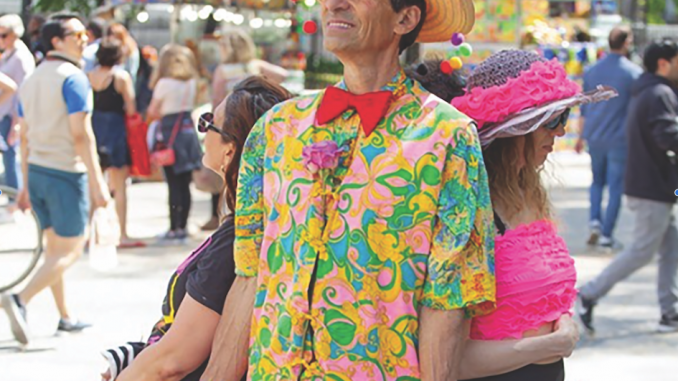
The first time I saw Lovejoy, I was drinking coffee with friends at the late and great Cafeteria Coffeehouse.
On that winter night, dozens of people had gathered for the weekly open mic. When the regular stream of poets and musicians trickled out, Lovejoy took the stage. He was an older man in a patchy rainbow shirt, khaki pants and a brown bowler hat with a bauble on its antennae. If you are a longtime New Paltz resident, you may have encountered Lovejoy the Clown.
He went by “Oglesby” then, and when stood before us with his flute, he started to do what I can only describe as creating chaos. He invited audience members to play guitar with him, and together they made music that was strange and raucous, but within the fogged-up windows of that overcrowded warehouse, the noises made us feel alive and weird,
Since the closing of Cafeteria, I have been chasing the energy that thrived inside the walls of 58 Main St. With this, I decided to give Lovejoy a call, and he picked up.
Lovejoy the Clown, known by his friends as Dagen Julty, is in his 60s now. His life has not taken what most would consider to be a traditional path, and he likes it that way. Julty started his career many years ago as a modern classical composer, then evolved into a piano teacher, a kids entertainer and eventually, a clown. He believes in callings, and that they can shift. He also believes that we are all drawn to do something.
Julty believes that the role of a clown is not only to understand a community, but to see the world around himself and point out the chaos of it all.
“The clown’s not inventing anything, he’s just throwing it back at the world,” Julty said. “Because it’s absurd already, isn’t it?”
He considers himself an artist, a clown and some sort of mystic. “There is a term ‘Shamanic clowning’– that is a term that comes from indigenous cultures – where you tap into the subconscious of the community, and then act things out. The clown will act out [dark emotions] so that people can laugh at them, accept themselves and move on.”
When Julty got his start as a kids’ entertainer, or what he would term a “merrymaker,” he looked around and realized there weren’t so many clowns in the world anymore.
“I started asking questions like ‘why are people afraid of clowns? What’s going on?’ And I came up with answers. We don’t have clowns because we live in a sort of dishonest world, and clowns would just make fun of it.”
The role of the clown is to “make fun,” but behind all of the noise of his act, Lovejoy’s mission is to emphasize the importance of the inner child and have as much fun as possible. He draws from figures like Pee-Wee Herman and Mr. Rogers as his inspirations.
“The inner child is so important to everybody, but in today’s world, a lot of kids don’t even get to have a childhood,” Julty said. “Childhood, innocence, curiosity about life, sweetness and all of those things are definitely in danger in this modern culture. There’s a big pressure to be adult and efficient and productive, and little kids pick up on that right away. So I come along as a clown, and I say you’re beautiful just the way you are. Let’s just play right now.”
Despite the importance he places on clowning, Julty can keep his life and art separate.
“I had to decide at some point, do I want to use my clown platform to extol my philosophy and my spirituality? And I came up with ‘no,’ I wanted to really delve into the world of absurdism, and what speaks to me. That’s my offering to the planet, is making nonsense, and seeing what’s on the other side of that.”
You can find Lovejoy the Clown on Facebook, or at Crossroads Open Mics on Monday nights.

